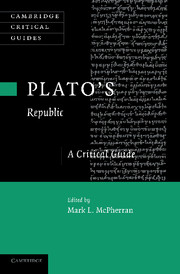Book contents
- Frontmatter
- Contents
- Acknowledgments
- List of contributors
- List of abbreviations
- Introduction
- 1 Socrates in the Republic
- 2 Platonic ring-composition and Republic 10
- 3 The Atlantis story: the Republic and the Timaeus
- 4 Ethics and politics in Socrates' defense of justice
- 5 Return to the cave
- 6 Degenerate regimes in Plato's Republic
- 7 Virtue, luck, and choice at the end of the Republic
- 8 Plato's divided soul
- 9 The meaning of “saphēneia” in Plato's Divided Line
- 10 Plato's philosophical method in the Republic: the Divided Line (510b–511d)
- 11 Blindness and reorientation: education and the acquisition of knowledge in the Republic
- 12 Music all pow'rful
- Bibliography
- Index of passages
- Index of names and subjects
7 - Virtue, luck, and choice at the end of the Republic
Published online by Cambridge University Press: 04 February 2011
- Frontmatter
- Contents
- Acknowledgments
- List of contributors
- List of abbreviations
- Introduction
- 1 Socrates in the Republic
- 2 Platonic ring-composition and Republic 10
- 3 The Atlantis story: the Republic and the Timaeus
- 4 Ethics and politics in Socrates' defense of justice
- 5 Return to the cave
- 6 Degenerate regimes in Plato's Republic
- 7 Virtue, luck, and choice at the end of the Republic
- 8 Plato's divided soul
- 9 The meaning of “saphēneia” in Plato's Divided Line
- 10 Plato's philosophical method in the Republic: the Divided Line (510b–511d)
- 11 Blindness and reorientation: education and the acquisition of knowledge in the Republic
- 12 Music all pow'rful
- Bibliography
- Index of passages
- Index of names and subjects
Summary
Human life occurs only once, and the reason we cannot determine which of our decisions are good and which bad is that in a given situation we can make only one decision; we are not granted a second, third, or fourth life in which to compare various decisions.
(Milan Kundera, The Unbearable Lightness of Being)The Republic famously ends with a consideration of the previously dismissed question of the rewards of justice by first proving the soul's immortality (Rep. 10, 608c–612a) and then arguing for the superiority of the just life in what appear to be purely consequentialistic terms. Plato begins by affirming Adeimantus' story (362d–363e) that the gods reward just souls and punish the unjust during the course of their earthly lives (612a–614a), and then – just as Cephalus feared (330d–331a) – the gods do the same in the afterlife (614a–621a). In the world as it is, the reputation of being just – though often ill-accorded – correctly reaps the external rewards that it typically does; but regardless of one's earthly reputation, the gods are fully aware of who is just and who is not, always loving the former and always hating the latter (612d–e; cf. 2, 362e–363e). Hence, although we might believe that those who are actually just are neglected in favor of those who are only seemingly just on those occasions when the actually just are visited by conventional evils (e.g., poverty, disease), these events must be understood to be only apparent evils: they are either beneficial punishments for previous errors or they assist the recipient in some other fashion.
- Type
- Chapter
- Information
- Plato's 'Republic'A Critical Guide, pp. 132 - 146Publisher: Cambridge University PressPrint publication year: 2010



